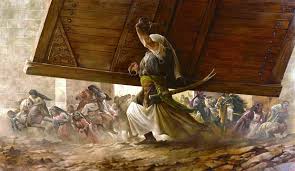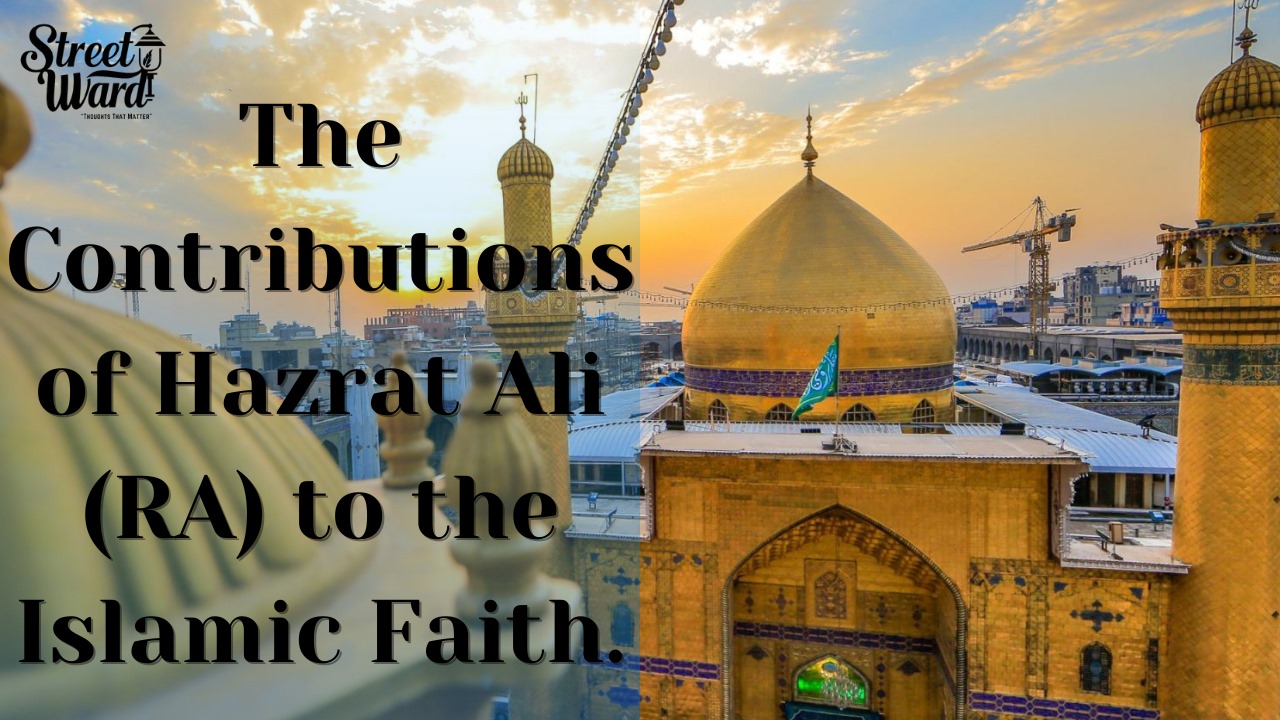The Contributions of Hazrat Ali to the Islamic Faith
Introduction:
Hazrat Ali, also known as Ali ibn Abi Talib, holds a significant place in the Islamic faith. As the cousin and son-in-law of Prophet Muhammad, Hazrat Ali played a crucial role in the early days of Islam and had a close relationship with the founder of the religion.
Early Life and Background of Hazrat Ali (RA):
Hazrat Ali was born in 599 AD in the city of Mecca, into the prominent tribe of Banu Hashim. As a member of the first convert to Islam, he grew up in the midst of the message of monotheism. Hazrat Ali had the privilege of being raised directly by the Prophet Muhammad, who treated him like a beloved son.

Hazrat Ali’s Contributions to Islam:
After the death of Prophet Muhammad, Hazrat Ali played a significant role in spreading the message of Islam and consolidating the early Muslim community. He served as the fourth caliph of Islam and his leadership during his caliphate was marked by wisdom, justice, and a commitment to upholding the principles of the faith.
Hazrat Ali was born in 599 AD in the city of Mecca, into the prominent tribe of Banu Hashim. As a member of the first convert to Islam, he grew up in the midst of the message of monotheism. Hazrat Ali had the privilege of being raised directly by the Prophet Muhammad, who treated him like a beloved son.
Battle of Badr
The Battle of Badr, fought on March 13, 624 CE (17 Ramadan, 2 AH in the Islamic calendar), was a significant turning point in early Islamic history. It was the first major battle between the early Muslims, led by the Prophet Muhammad, and the Quraysh tribe of Mecca, who were their adversaries.
Key Details:
- Background: The battle occurred against the backdrop of increasing tensions between the Muslims of Medina and the Quraysh, who had migrated from Mecca after the rise of Islam. The Muslims, seeking to protect their community, aimed to intercept a caravan belonging to the Quraysh.
- Forces: The Muslim force numbered around 313 men, while the Quraysh army was about 1,000 strong. Despite being outnumbered, the Muslims had certain advantages, including the element of surprise and strong motivation.
- Key Events:
- The Muslims mobilized to intercept a caravan under Abu Sufyan, but they eventually engaged in a full battle when they encountered a larger Quraysh force.
- The battle was marked by several key individual combats and strategic movements.
- The Muslims ultimately achieved a decisive victory, with many Quraysh leaders killed, including notable figures like Abu Jahl.
- Consequences:
- The victory at Badr significantly boosted the morale of the Muslim community and established Muhammad’s leadership.
- It intensified the conflict between Muslims and the Quraysh, leading to further battles and skirmishes.
- The battle is often seen in Islamic tradition as a sign of divine support for Muhammad and the early Muslims.
- Significance in Islamic Tradition: Badr is celebrated in Islamic history; it is seen as a test of faith and perseverance. The Quran references this battle, illustrating the idea that divine assistance can manifest in moments of great need.
The Battle of Badr is not only a military event but also a symbol of the struggle for the early Muslim community and their eventual success against overwhelming odds.
Battle of Uhud
The Battle of Uhud was a significant battle fought on March 23, 625 CE (3 Shawwal, 3 AH in the Islamic calendar). It was the second major battle between the early Muslims, led by Prophet Muhammad, and the Quraysh tribe of Mecca, following the notable victory at the Battle of Badr.
Key Details:
- Background: The Quraysh sought revenge for their defeat at Badr, where many prominent leaders were killed. The Meccans aimed to re-establish their authority and suppress the growing influence of Islam in Medina.
- Forces: The Muslim army consisted of approximately 700 fighters, whereas the Quraysh had around 3,000 soldiers, including experienced warriors and allies. Despite being smaller in number, the Muslims had the advantage of fighting on their home ground.
- Location: The battle took place on the slopes of Mount Uhud, close to Medina. The mountain’s geography played a crucial role in the battle’s strategy.
- Key Events:
- Initially, the Muslims were gaining the upper hand in the battle. However, a group of archers, stationed on a hill to protect the Muslim flank under the command of Abdullah ibn Jubair, disobeyed Muhammad’s orders and left their positions to pursue spoils of war after the initial successful engagement.
- This opened up the Muslim flank, allowing Khalid ibn al-Walid, a commander of the Quraysh, to launch a surprise attack. The situation quickly turned against the Muslims, resulting in significant casualties.
- Muhammad himself was injured during the battle, and several prominent companions, including Hamza ibn Abdul-Muttalib, were killed.
- Consequences:
- Although the battle did not result in a clear victory for either side, the Muslims faced heavy losses—around 70 of their fighters were killed.
- The battle reinforced the Quraysh’s resolve and demonstrated the ongoing struggle between the two factions.
- The defeat at Uhud had a demoralizing effect on the Muslim community, but it also taught valuable lessons about discipline and the importance of unity and obedience to leadership.
- Significance in Islamic Tradition: The Battle of Uhud is regarded as a test of faith for the Muslims. The period following the battle is remembered for the resilience and determination of the Muslim community, with many individuals rallying to support Muhammad after the loss. The battle is often cited in Islamic teachings as an example of the importance of faith, commitment, and adherence to divine guidance.
Overall, the Battle of Uhud highlighted the challenges faced by the early Muslim community and set the stage for future confrontations with the Quraysh and other tribes.
Hazrat Ali’s Wisdom Through Quotes:
Throughout his life, Hazrat Ali shared profound insights and teachings through his quotes. These quotes serve as a reflection of his wisdom, faith, and commitment to justice. For example, one of his famous quotes is, “Do not let your difficulties fill you with anxiety; after all, it is only in the darkest nights that stars shine more brightly.”
His quotes provide guidance on various aspects of life, including morality, leadership, and spirituality. Exploring and interpreting these quotes can help readers gain a deeper understanding of Hazrat Ali’s teachings.
Some Quotes of Hazrat Ali(RA):
“He who has courage and faith will never be forsaken.”
“A fool’s mind is at the mercy of his tongue and a wise man’s tongue is under the control of his mind.”
“The greatest wealth is to live content with little.”
“Do not let your difficulties fill you with anxiety; after all, it is only in the darkest nights that stars shine more brightly.”
“Your remedy is within you, but you do not sense it. Your sickness is from you, but you do not perceive it.”
“Nothing hurts a good soul and a kind heart more than to live amongst people who cannot understand it”
“Life consists of two days, one for you one against you. So when it’s for you don’t be proud or reckless, and when it’s against you be patient, for both days are test for you”
HAZRAT ALI (RA)
Marraige and Family Life:
Hazrat Ali (ra) had a blessed and significant marriage and family life. He married the beloved daughter of Prophet Muhammad (peace be upon him), Fatimah bint Muhammad (ra). Their marriage is considered one of the most revered unions in Islamic history.
Hazrat Ali and Fatimah had a deep and loving relationship. They were known for their strong bond based on mutual respect, love, and devotion to Allah. Their union reflected the purity and nobility of character that they both possessed.
Together, Hazrat Ali and Fatimah had several children, including Hasan ibn Ali (ra) and Husayn ibn Ali (ra) who are also highly respected figures in Islam. They also had three other sons, Muhammad ibn Ali (ra), Ja’far ibn Ali (ra), and Uthman ibn Ali (ra). They also had two daughters, Zainab bint Ali (ra) and Umm Kulthum bint Ali (ra).
Hazrat Ali and Fatimah led a simple and humble life, despite their status as the Prophet’s family. They practiced gratitude and contentment with what Allah provided for them. Their household was characterized by piety, kindness, and devotion to Allah and His Messenger.
Hazrat Ali’s dedication to his family was exemplary. He played an active role in nurturing and guiding his children, instilling in them the teachings of Islam. He led by example, teaching them the values of righteousness, justice, and compassion.
Even after the Prophet’s demise, Hazrat Ali and Fatimah remained firm in their commitment to Islam and the welfare of their family. They played critical roles in ensuring the preservation and dissemination of the Prophet’s teachings and protecting the rights of Ali’s rightful succession to leadership.
Unfortunately, Hazrat Ali’s marriage and family life were cut short by the tragic events that transpired in the early years of Islam. Hazrat Ali himself was martyred, and Fatimah passed away soon after, leaving their children orphaned.
Hazrat Ali (RA) Death:
Hazrat Ali ibn Abi Talib was assassinated on the 19th of Ramadan, in the year 661 CE (40 AH), while he was leading the Fajr prayer in the mosque of Kufa, in present-day Iraq. He was attacked by a radical named Abd al-Rahman ibn Muljam, who struck him with a poisoned sword. Hazrat Ali succumbed to his injuries two days later, on the 21st of Ramadan.
His death marked a significant turning point in Islamic history and is viewed differently in Sunni and Shia traditions. In Shia Islam, Ali’s martyrdom is commemorated during the month of Ramadan, particularly by mourning rituals associated with the tragedy of Karbala and the rightful leadership of the Muslim community.
Ali’s legacy as a leader, warrior, and scholar has continued to influence Islamic thought and practice. He is revered as the first Imam by Shia Muslims and the fourth Caliph in Sunni tradition. His life and teachings emphasize justice, piety, and devotion to Islam.
Legacy of Hazrat Ali (RA):
The contributions of Hazrat Ali continue to have a lasting impact on the Islamic faith and Muslim communities. His leadership and devotion to justice are still celebrated today. His teachings continue to resonate with believers, serving as a source of inspiration for individuals striving to uphold the values of Islam.
Conclusion:
Hazrat Ali’s role in the early days of Islam and his contributions to the faith are of immense importance. By reflecting on his teachings and sharing his wisdom, we can further strengthen our understanding of Islam and foster a sense of community among believers. Let us remember Hazrat Ali’s teachings and strive to embody the principles he stood for.








🙌🫶🫶🫶